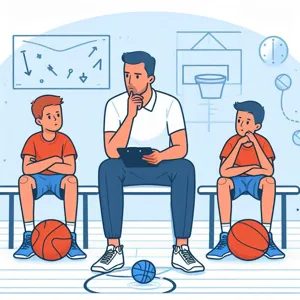Coaching a youth basketball team is not just about teaching the fundamentals of the game; it’s about fostering a love for sports, building teamwork, and instilling confidence in young athletes.
As the excitement of the basketball season approaches, coaches often find themselves navigating a unique set of challenges, from balancing skill development with fun to ensuring every player feels valued and motivated. Whether you are a seasoned coach or stepping onto the court for the first time, having a solid strategy can make all the difference in creating a positive and impactful experience for your players. In this blog post, we’ll explore the top 10 essential tips for coaching a successful youth basketball team, providing you with practical insights and techniques to inspire your players, cultivate their skills, and guide them toward both personal and athletic growth. Get ready to hit the court with confidence and enthusiasm as we dive into the key elements that will lead your team to success!
1. Understand the Fundamentals of the Game

Understanding the fundamentals of basketball is crucial for any coach aiming to build a successful youth team. Before you step onto the court, it’s essential to have a solid grasp of the game’s core principles, including dribbling, passing, shooting, defense, and teamwork. These foundational skills not only serve as the building blocks for individual player development but also foster a cohesive team dynamic.
Start by immersing yourself in the rules of the game. Familiarize yourself with how the game is played, including violations, fouls, and scoring systems. This knowledge will empower you to teach your players effectively and help them understand the nuances of basketball, ensuring they can make smart decisions on the court.
Next, prioritize skill development by designing practice sessions that focus on these fundamentals. Incorporate drills that emphasize dribbling techniques, shooting accuracy, and passing precision. For instance, you might implement cone drills to improve ball handling or shooting contests to enhance accuracy under pressure. By consistently reinforcing these skills, you’ll not only boost your players’ confidence but also cultivate a strong foundation they can build on as they advance in their basketball journey.
Moreover, it’s vital to instill a love for the game. Passion is contagious, and when you demonstrate your enthusiasm for basketball, your players are likely to mirror that energy. Share stories of legendary players, highlight the importance of teamwork, and always celebrate small victories. By fostering a positive environment where fundamentals are valued alongside enjoyment, you set the stage for both personal growth and team success.
In summary, understanding the fundamentals of basketball is not just about knowing the game; it’s about imparting that knowledge to your players in a way that inspires them. Equip them with the skills they need, create engaging practice sessions, and ignite a passion for the game, and you’ll be well on your way to coaching a successful youth basketball team.
2. Create a Positive Team Culture
Creating a positive team culture is the cornerstone of coaching a successful youth basketball team. The environment you foster can significantly influence not only the performance of your players on the court but also their personal growth and enjoyment of the game. A positive culture begins with establishing clear values that promote teamwork, respect, and inclusivity. Encourage open communication among players, inviting them to share their thoughts and feelings. This practice helps build trust and strengthens relationships within the team, making each player feel valued and heard.
Additionally, celebrate individual and team achievements, no matter how small. Recognizing effort and progress helps boost confidence and motivates players to strive for improvement. Incorporate fun team-building activities that emphasize collaboration and camaraderie, both on and off the court. These experiences not only create lasting memories but also forge bonds that can enhance team dynamics during games.
As a coach, your attitude plays a pivotal role in shaping the team culture. Model positivity and sportsmanship, demonstrating how to handle both victories and defeats with grace. Encourage players to support one another, fostering an atmosphere where they cheer each other on and learn from mistakes collectively. When players feel safe to express themselves and grow, they are more likely to embrace challenges and develop a lifelong love for the game. Ultimately, a positive team culture not only leads to better performance but also cultivates resilience, friendship, and valuable life lessons that extend far beyond the basketball court.
3. Set Clear Goals and Expectations

Setting clear goals and expectations is foundational to the success of any youth basketball team. As a coach, your vision for the season should be communicated effectively to both players and their parents. Begin by outlining what you aim to achieve—this could range from improving individual skills, fostering teamwork, to winning a specific number of games. Clarity in these objectives not only helps to align the efforts of the team but also instills a sense of purpose among the young athletes.
When establishing goals, consider involving the players in the discussion. This collaborative approach empowers them and makes the goals feel more personal and attainable. For instance, you might hold a team meeting at the start of the season where each player shares their individual aspirations, whether it’s becoming a better shooter or mastering defensive skills. By integrating these personal goals into the team’s broader objectives, you create a cohesive environment where everyone is working toward shared success.
Additionally, setting expectations around behavior, practice attendance, and teamwork is crucial. Make it clear that every player is expected to show up on time, put in their best effort during practices, and support their teammates on and off the court. Establishing a code of conduct not only fosters a respectful atmosphere but also cultivates accountability among the players.
Regularly revisit these goals throughout the season, celebrating progress and making adjustments as necessary. By consistently emphasizing the importance of these objectives, you help instill a growth mindset in your players, encouraging them to strive for improvement while enjoying the journey of learning the game. Remember, when players understand what is expected of them, they are far more likely to stay motivated, engaged, and committed to the team’s success.
4. Focus on Skill Development
When coaching a youth basketball team, one of the most critical aspects to prioritize is skill development. At this stage, players are not only learning the game; they are also building their foundational skills that will carry them through their basketball journey. A focus on skill development ensures that each player understands the fundamentals, from dribbling and shooting to passing and defensive techniques.
Start by creating a well-structured practice plan that incorporates drills targeting essential skills. For instance, set aside time for dribbling exercises that enhance ball-handling proficiency, such as cone drills and zig-zag runs. Incorporate shooting drills that emphasize proper form and footwork, making use of both stationary shots and movement-based scenarios. Develop passing drills that encourage teamwork and communication, like the “three-man weave” or “give-and-go” drills, which reinforce the importance of working together on the court.
While individual skill development is vital, it’s equally important to foster an environment of teamwork and camaraderie. Encourage players to support one another, celebrating both individual and team successes. This not only enhances their skills but also cultivates a sense of belonging and motivation among teammates.
Additionally, consider the varying skill levels within your team. Tailor your approach to ensure that each player receives the attention they need to grow. For those who may be more advanced, introduce challenges that push their boundaries, such as competitive shooting contests or advanced defensive techniques. For beginners, simplify techniques and provide positive reinforcement to build their confidence.
Remember, the goal is not solely to win games but to instill a love for the sport and a commitment to continuous improvement. By focusing on skill development, you lay the groundwork for a team that not only excels on the court but also carries valuable lessons in perseverance and hard work off the court. With a strong emphasis on skill-building, your youth basketball players will be well-equipped to face challenges, not just in the game, but in their future endeavors as well.
5. Emphasize Communication and Teamwork

Effective communication and teamwork are the cornerstones of any successful youth basketball team. As a coach, your role extends beyond just teaching plays and strategies; you are also responsible for fostering an environment where players feel comfortable expressing themselves and collaborating with one another. Start by establishing clear channels of communication. Encourage your players to voice their thoughts during practices and games, whether it’s about a play that isn’t working or offering a supportive word to a teammate. This openness builds trust and helps players feel valued, which is crucial at this impressionable age.
Moreover, emphasize the importance of teamwork during every practice and game. Use drills that require players to work together, such as passing drills or scrimmages that focus on ball movement rather than individual play. This not only hones their skills but also reinforces the idea that basketball is a collective effort. Celebrate team successes—whether it’s a well-executed play or solid defense—as much as individual achievements. Create opportunities for players to bond off the court as well; team-building activities, such as group outings or challenges, can strengthen relationships and enhance on-court synergy.
In every practice, remind players that communication is not just about talking; it’s also about listening and understanding their teammates’ needs. Encourage them to use positive reinforcement, cheering each other on during tough moments. By fostering a culture of open dialogue and cooperation, you will not only enhance your team’s performance but also instill lifelong values of respect and collaboration that extend far beyond the basketball court.
6. Implement Effective Practice Plans
When it comes to coaching a successful youth basketball team, implementing effective practice plans is crucial. A well-structured practice not only maximizes the time spent on the court but also keeps players engaged and focused. Start by outlining clear objectives for each session, ensuring that every drill and activity aligns with your team’s overall goals.
Begin your practice with a dynamic warm-up to get the players energized and ready to play. Incorporating stretching, agility drills, and ball-handling exercises can set a positive tone and help prevent injuries. Following the warm-up, introduce fundamental skills through focused drills—whether it’s shooting techniques, passing accuracy, or defensive positioning. Each drill should be tailored to address the specific needs of your team, allowing players to build upon their strengths and improve on their weaknesses.
As practice progresses, incorporate game-like scenarios to help players apply what they’ve learned in a competitive setting. Small-sided games, scrimmages, and situational drills foster teamwork and communication, essential elements for any successful basketball team. Additionally, consider rotating players through different positions to develop versatility and a deeper understanding of the game.
Don’t forget to include time for cool-down and reflection at the end of each practice. This allows players to discuss what they learned, ask questions, and set personal goals for future sessions. By consistently implementing effective practice plans, you not only enhance your players’ skills but also instill a sense of discipline and teamwork that will contribute to their overall development—both on and off the court.
7. Foster a Growth Mindset

Fostering a growth mindset within your youth basketball team is essential for cultivating a culture of resilience, perseverance, and continuous improvement. This philosophy, popularized by psychologist Carol Dweck, emphasizes the belief that abilities and intelligence can be developed through dedication, hard work, and constructive feedback. As a coach, instilling this mindset in your players not only enhances their skills on the court but also positively shapes their character off the court.
To promote a growth mindset, start by encouraging your players to embrace challenges rather than shy away from them. Celebrate their efforts, regardless of the outcome, and highlight the importance of learning from mistakes. For instance, after a tough game, instead of focusing solely on the score, gather your team and discuss what they learned from the experience. Ask questions like, “What could we do differently next time?” or “What strengths did we showcase today that we can build on?” This will help them see setbacks as opportunities for growth rather than failures.
Additionally, model a growth mindset yourself. Share your own experiences of overcoming obstacles and seeking improvement. Demonstrate that even as a coach, you are always learning and adjusting your strategies. Use positive reinforcement to recognize individual and team improvements, no matter how small. Whether it’s mastering a new drill or displaying better teamwork, acknowledging these advancements fosters an environment where players feel safe to take risks and challenge themselves.
Incorporate growth-oriented language into your coaching. Instead of labeling players as “talented” or “naturally gifted,” emphasize the importance of practice and effort. Phrases like “You’re improving because you’re working hard” or “Your dedication is what makes you better” reinforce the idea that success is a journey shaped by persistence. By prioritizing a growth mindset, you not only enhance your players’ basketball skills but also equip them with valuable life lessons that extend far beyond the court.
8. Encourage Sportsmanship and Respect
Encouraging sportsmanship and respect is a cornerstone of fostering a positive environment in youth basketball. As a coach, your influence extends beyond teaching the fundamentals of the game; you have the unique opportunity to instill values that will shape your players both on and off the court.
Sportsmanship is not just about winning; it’s about how you conduct yourself during competition. Make it a priority to highlight the importance of treating opponents, referees, and teammates with respect. This can be reinforced through discussions about fair play, acknowledging the efforts of others, and handling victory or defeat with grace. Encourage players to shake hands with opponents after games, applaud good plays made by the other team, and to maintain a positive attitude, regardless of the score.
Moreover, emphasize the importance of respect within the team. Foster an atmosphere where players feel safe to express themselves and support one another. Create team-building activities that promote camaraderie and trust, such as group discussions or fun off-court challenges. When players respect one another, they are more likely to communicate effectively and work together, which translates into better teamwork during games.
As you model sportsmanship and respect in your own behavior—whether it’s demonstrating good sportsmanship in your reactions to refereeing decisions or showing respect towards parents and fans—you set a powerful example for your players to follow. By embedding these values into the culture of your team, you not only enhance their basketball experience but also equip them with life lessons they will carry well beyond the court. In the end, a team that plays with integrity and respect is bound to leave a lasting legacy, creating a positive impact on the players and the community alike.
9. Adapt Coaching Styles to Individual Players
In the world of youth basketball, one size certainly does not fit all. Each player brings their own unique blend of skills, personality traits, and learning styles to the court. To foster an environment where every athlete can thrive, it’s essential for coaches to adapt their coaching styles to meet the individual needs of their players. This approach not only boosts on-court performance but also enhances players’ confidence and enjoyment of the game.
Begin by taking the time to get to know each player personally. Understand their motivations, strengths, and areas for improvement. Are they a natural leader who thrives on encouragement, or do they perform best under a more structured, disciplined approach? Some players may need more hands-on guidance, while others may flourish with independence and freedom to explore their creativity on the court. Recognizing these nuances can make all the difference in your coaching effectiveness.
Implement a variety of teaching techniques during practices. For instance, while some players might benefit from visual demonstrations or video analysis, others may respond better to verbal instructions or kinesthetic learning, where they learn by doing. By diversifying your methods, you can engage every player in a way that resonates with them personally.
Moreover, be prepared to adjust your strategies mid-game. If a player is struggling against a particular opponent, or if the game plan isn’t yielding results, demonstrating flexibility and offering tailored feedback can help them adapt and grow in real-time. This not only helps develop their skills but also teaches valuable lessons about resilience and problem-solving.
Ultimately, adapting your coaching style to individual players cultivates a more inclusive and supportive team atmosphere. By showing that you value each player as a unique contributor, you foster a sense of belonging that encourages dedication and hard work—keys to building a successful and harmonious youth basketball team.
10. Involve Parents and Guardians
Involving parents and guardians in your youth basketball program is not just beneficial; it’s essential for creating a thriving team environment. When parents feel connected to the team, they are more likely to support their children’s participation, contributing to a more positive atmosphere both on and off the court.
Start by communicating clearly and frequently. Regular newsletters, emails, or team messaging apps can keep everyone informed about practice schedules, game times, and any changes to the season’s itinerary. Consider hosting pre-season meetings where you can outline your coaching philosophy, goals for the team, and expectations for both players and parents. This transparency fosters trust and ensures that everyone is on the same page.
Encourage parental involvement during practices and games, whether by volunteering to help with organization, providing snacks, or even keeping score. This not only strengthens the community but also allows parents to witness firsthand the progress their children are making. Create opportunities for parents to contribute their unique skills—perhaps one is a local chef who could provide healthy snacks, while another has experience in first aid and can assist during games.
Additionally, consider forming a parent committee that can help with logistics, fundraising, or organizing team events. This gives parents a sense of ownership and investment in the team’s success, which can lead to increased enthusiasm and support for your coaching efforts.
Moreover, maintain an open line of communication with parents, welcoming their feedback and suggestions. By doing so, you empower them to be active participants in their children’s sporting experience, which can lead to increased motivation and commitment from young athletes.
Ultimately, when parents and guardians feel involved and valued, it transforms the youth basketball experience into a collaborative journey, fostering a sense of community that not only enhances team spirit but also contributes to the development of young athletes both on and off the court.
11. Use Game Situations for Learning
Using game situations for learning is one of the most effective methods to enhance the skills and understanding of young basketball players. Rather than relying solely on drills and theoretical instruction, incorporating real-game scenarios into practice provides players with invaluable experience that helps bridge the gap between practice and competition.
Imagine setting up practice sessions that mirror the intensity and unpredictability of an actual game. You can break the team into smaller groups and simulate specific plays or defensive strategies, allowing players to experience the pressure of making quick decisions in real time. This hands-on approach not only enhances their tactical understanding but also builds their confidence in applying those skills during live games.
Moreover, using game situations allows you to teach critical lessons about teamwork and communication. By encouraging players to work together in these high-pressure scenarios, you can cultivate a sense of camaraderie and foster a supportive team environment. For example, during a scrimmage, prompt players to call out plays or signal each other when switching defenses. This not only reinforces the importance of communication but also helps them learn to trust one another on the court.
Additionally, analyzing game footage can serve as a powerful educational tool. After a game, gather the team to review specific moments and discuss what worked, what didn’t, and why. This reflective practice not only reinforces learning but also encourages players to take ownership of their development.
Incorporating game situations into your coaching strategy not only makes practice more engaging but also equips young athletes with the skills they need to excel both on and off the court. By emphasizing real-world applications, you’re preparing them for the challenges of competitive play while instilling a deeper love for the game.
12. Monitor Player Health and Well-being
Monitoring player health and well-being is a crucial responsibility for any youth basketball coach. The foundation of a successful team goes beyond just skill development; it hinges on the physical and mental wellness of each athlete. As a coach, it’s vital to foster an environment where players feel safe, supported, and understood, both on and off the court.
Regularly checking in with your players about their physical condition can help identify any potential injuries or fatigue before they escalate into more serious issues. Encourage open communication, where players feel comfortable sharing how they feel—whether they are recovering from a tough practice, experiencing soreness, or feeling overwhelmed. This not only builds trust but also allows you to adjust practices and game plans accordingly.
Moreover, mental well-being is equally important. The pressures of competition, coupled with academic responsibilities, can weigh heavily on young athletes. Be attentive to signs of stress or anxiety, and create a culture that prioritizes mental health. Incorporating team-building exercises, mindfulness practices, or even just providing moments of relaxation can significantly enhance their emotional resilience.
Additionally, staying informed about nutrition and hydration is key. Educate your players on the importance of a balanced diet and staying hydrated, especially during intense training sessions or games. Consider organizing workshops or inviting guest speakers, such as nutritionists or sports psychologists, to share valuable insights with your team.
Ultimately, by prioritizing the health and well-being of your players, you not only enhance their performance on the court but also contribute to their overall development as individuals. This holistic approach will help cultivate a positive team culture, ensuring that young athletes thrive both in basketball and in life.
13. Celebrate Achievements and Progress
Celebrating achievements and progress is a crucial element in coaching a successful youth basketball team. Each milestone, whether big or small, deserves recognition to foster a positive team culture and boost players’ confidence. This doesn’t just pertain to winning games; it encompasses personal improvements, teamwork, and sportsmanship as well.
Begin by acknowledging individual milestones—like a player mastering a new skill, making their first three-pointer, or displaying exemplary teamwork during a game. A simple shout-out during practice or a personalized note can go a long way in making a player feel valued. Consider creating a “Player of the Week” award, where you highlight one player’s dedication and improvement. This not only motivates the individual but also inspires the entire team to strive for excellence.
Team achievements should also be celebrated. After a hard-fought game, regardless of the outcome, take time to reflect on what the team did well. Host a small gathering after the game where players can enjoy snacks and share their thoughts about the match. This informal setting allows for camaraderie to build and reinforces the idea that every game is a learning experience.
Don’t forget to involve parents in the celebration. Sending out newsletters or posting on social media about the team’s progress helps keep families engaged and encourages them to support their young athletes.
By consistently celebrating both individual and team achievements, you create an environment that values growth, effort, and teamwork. This not only enhances players’ enjoyment of the game but also lays the foundation for a positive and successful basketball experience that will keep them coming back season after season.
14. Seek Continuous Improvement as a Coach
Coaching youth basketball is not just about imparting skills and strategies; it’s also about personal growth as a mentor. To truly inspire your young athletes, you must prioritize your own continuous improvement as a coach. This journey begins with a mindset of learning and adaptability. Attend coaching clinics, engage in online courses, or read books about basketball tactics and team dynamics. Each resource offers fresh insights that can enhance your coaching philosophy and methods.
Consider seeking feedback from peers, parents, and, most importantly, your players. Their perspectives can illuminate areas where you might improve, whether it’s refining your communication style or adjusting your practice drills to better suit the team’s needs. Embrace constructive criticism as a tool for development rather than a setback.
Additionally, stay updated on the latest coaching trends and techniques. The world of sports is ever-evolving, and innovations in training methods, conditioning, and game analysis can provide you with new strategies to implement with your team. Networking with other coaches can also foster a culture of shared knowledge and mutual support.
Never underestimate the impact of self-reflection. After each game or practice, take the time to assess what went well and what could be improved. This will not only enhance your coaching skills but will also model a growth mindset for your players, teaching them the importance of striving for excellence both on and off the court. By committing to continuous improvement, you set a powerful example that can inspire your athletes to reach their full potential.
15. Build Long-lasting Relationships with Players
Building long-lasting relationships with your players is arguably one of the most rewarding aspects of coaching a youth basketball team. It transcends the game itself and fosters an environment where athletes feel valued, understood, and motivated to improve. Establishing these connections begins with open communication; take the time to engage in conversations beyond basketball. Ask about their interests, school life, and goals, and show genuine curiosity in their thoughts and feelings.
Be present during practices and games, but also make an effort to attend school events or community gatherings where your players are featured. This not only shows that you care about them as individuals but also strengthens the trust between you and your team. Consider hosting team-building activities, such as outings or volunteer events, where players can bond outside of the court. This shared experience can cultivate a sense of unity and teamwork that will translate into better on-court chemistry.
Moreover, be consistent in your approach. When players know they can rely on you for support and guidance, it creates a safe space for them to express their concerns and aspirations. Recognize their efforts, both big and small, and provide constructive feedback that encourages growth. Celebrate their successes and remind them that mistakes are part of the learning process. Your role as a coach extends beyond teaching basketball skills; you are also a mentor who can guide them through challenges and teach them valuable life lessons.
Ultimately, the relationships you build with your players will not only enhance their experience on the court but will also leave a lasting impact on their lives. These connections can create a positive team culture that fosters resilience, teamwork, and a lifelong love for the game. In the end, the memories and bonds formed during this time will be cherished long after the final whistle blows.
In conclusion, coaching a successful youth basketball team is a rewarding journey that requires patience, dedication, and a genuine passion for the game. By implementing the top 10 essential tips we’ve shared, from fostering a positive team culture to focusing on skill development and communication, you’ll not only enhance your players’ abilities but also instill in them a love for the sport that can last a lifetime. Remember, the impact you have as a coach goes beyond the scoreboard; it’s about teaching valuable life lessons, building character, and creating unforgettable memories on and off the court. As you embark on this coaching adventure, stay flexible, keep learning, and most importantly, have fun—your enthusiasm will inspire your team to reach new heights!






